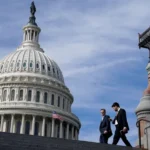Energy News Beat
The desire to control so much of other people’s lives is inconsistent not only with liberalism, but with the U.S. Constitution.
Government has controlled so much of our lives for so long, it now seems normal, even rational. Where we live. Where we work. Whom we hire. What becomes of our labor. What we eat. The precise share of our contraceptives bill that our health insurance will cover. Prices and other terms of innumerable economic exchanges.
Congress has passed so many laws, regulating almost every aspect of our lives, that it cannot possibly manage them all. Most governments are even worse, mind you: According to the Cato Institute’s Human Freedom Index, only 16 countries have more overall freedom than the United States. Only four have more economic freedom. Yet Congress still has not the time, knowledge, or other resources necessary to specify the precise rules it demands the people follow. Like every legislature throughout history, Congress relies on executive agencies to fill in the details.
But the more rules a legislature imposes on the people, the less able it is to specify the details itself, and the more it must abdicate to executive agencies its power — its duty — to write the laws.
Likewise, the more rules a legislature imposes on the people, and the more executive agencies fill in the details, the more often people will dispute an agency’s interpretation of exactly what duties or benefits the law creates. Under the U.S. Constitution, when there is a dispute over what the law says, it is the duty of Article III courts — the judiciary — to decide.
In Chevron and subsequent cases, the Supreme Court abdicated that duty. It chose to let executive agencies decide what the law says, even if the agency’s interpretation was not the best, so long as the courts found that interpretation “reasonable.” The Supreme Court responded to Congress abdicating its essential legislative duty by abdicating the Court’s essential judicial duty.
Chevron thus shifted massive power from elected legislatures and unelected (but independent) judges to unelected (but often explicitly political) bureaucrats. It so accustomed agencies to getting their way, one agency thought little of claiming that the U.S. government counts as a “State” — even though the statute defines “State” to mean “each of the 50 states and the District of Columbia.”
That absurd interpretation, by the way, would just happen to allow the agency to tax and spend billions of dollars that it otherwise could not. Straight-faced government lawyers then argued that the Supreme Court should defer to that interpretation. (Nuts, right? Keep reading.)
In Loper Bright, the Supreme Court finally discarded Chevron. The Court held that judges must discharge their constitutional duty to say what the law is.
Those who advocate massive government intervention in the economy are apoplectic. They believe that if Congress cannot delegate such massive powers to executive agencies, then the federal government cannot competently direct the economy, redistribute income, and enrich their favorite special interests.
And they are right.
The uncomfortable truth that Chevron supporters do not want to admit is that their desire to control so much of other people’s lives is inconsistent not only with liberalism but with that most magnificent manifestation of liberalism, the U.S. Constitution. In Loper Bright, the Supreme Court faced a decision between liberalism and the rule of law on the one hand, and an anti-liberal ideological agenda on the other. It made the right choice.
And not a moment too soon. In his 1944 book The Road to Serfdom, Nobel Prize–winning economist Friedrich Hayek explained that when legislatures attempt to direct the economy, their incompetence will increasingly lead to calls to concentrate power in the hands of government officials who have increasingly less regard for liberal values such as individual liberty, the separation of powers, the rule of law, or democratic accountability. Loper Bright restores the separation of powers and thereby strips power from any bureau-cum-auto-crats.
Loper Bright does not dismantle the administrative state. It does not even mean we are no longer heading down the road to serfdom. But it does tap the brakes.
Or maybe it won’t even do that. In King v. Burwell, the case where the agency said the federal government is a state, the Supreme Court discarded Chevron — but nevertheless adopted that absurd interpretation.
Requiring judges to do their job is no guarantee that they will do it well. But it’s a start.
Take the Survey at https://survey.energynewsbeat.com/
Crude Oil, LNG, Jet Fuel price quote
ENB Top News
ENB
Energy Dashboard
ENB Podcast
ENB Substack
The post The End of Chevron Deference: Tapping the Brakes on the Road to Serfdom appeared first on Energy News Beat.








